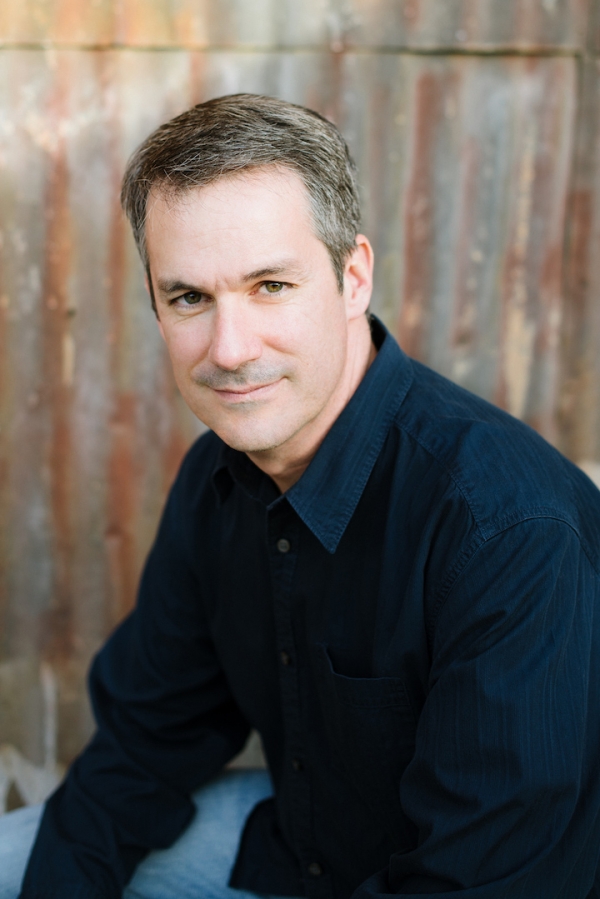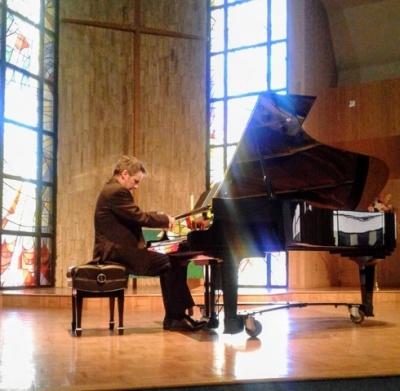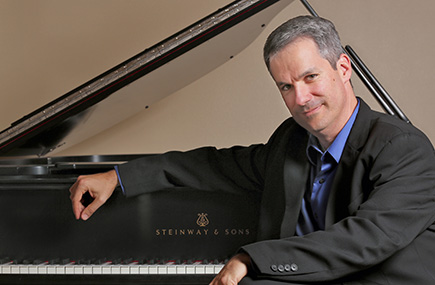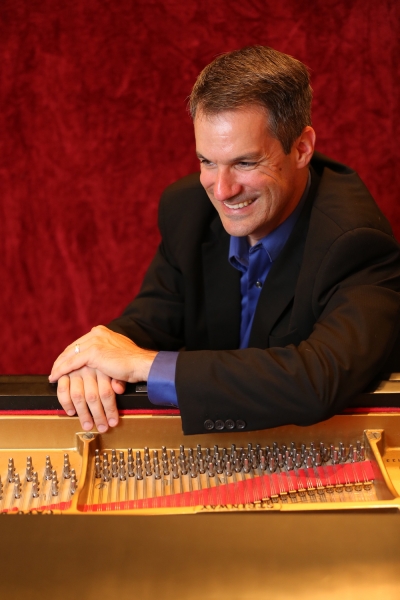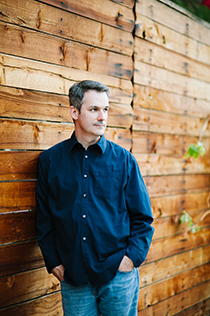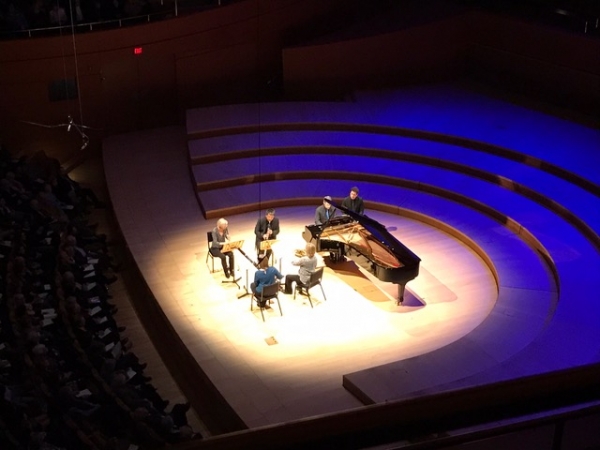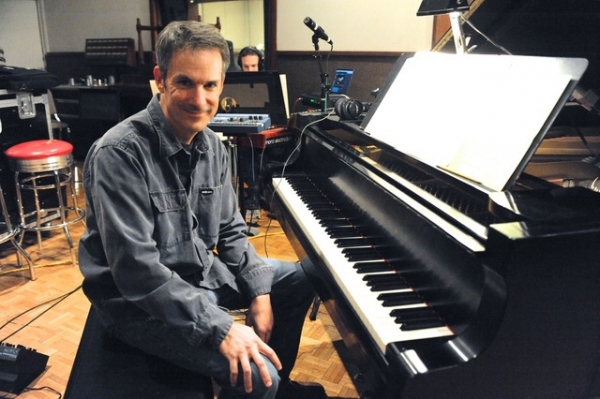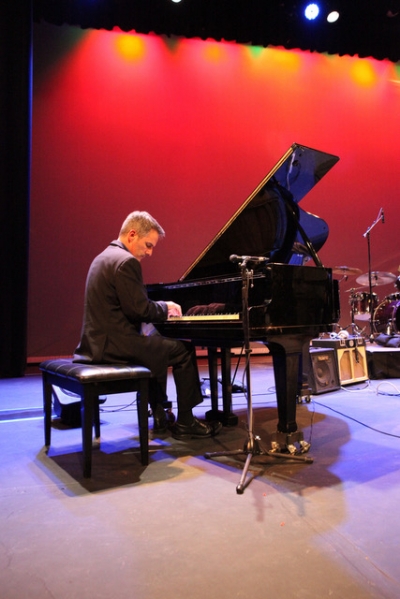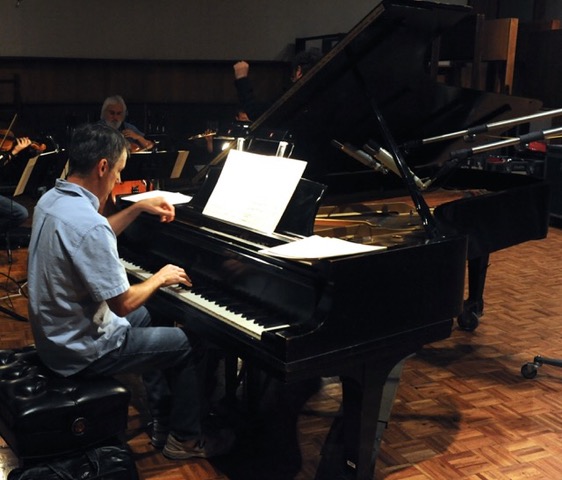I have had the pleasure of interviewing a fascinating group of artists, but this interview is unique in that Robert Thies was the Gold Medal Winner of the 1995 Prokofiev International Piano Competition in St. Petersburg, Russia - he and Van Cliburn are the only two American pianists to win the Gold in a Russian piano competition (Van Cliburn won in 1958). Robert has also released a series of three improvised albums with Croatian flutist, Damjan Krajacic called
Blue Landscapes. Robert's story is compelling and I feel honored that he shared it with me - and with you. Enjoy!
KP: Hi Robert! How is your 2021 so far?
RT: Well, in some ways it’s looking a lot like 2020, but with a new White House administration, and with the rolling out of vaccines, I’m feeling optimistic that this year will pan out to be much better than last year was.
KP: I sure hope so! We "met" in 2017 when you sent me Blue Landscapes II: Discoveries to review. I enjoyed that album so much that I requested the first album in the series. Blue Landscapes III: Frontiers was released last year and I said in my review that it is "extraordinary in its artistry." Tell us about the series.
RT: My life career has been on an interesting trajectory. I’m kind of riding the wave myself to see where things go. On the whole, I have made a living as a concert pianist, playing solo recitals, concerti, and chamber music with musicians and orchestras around the world. Though classical music is still my first love, I have always had an interest in other avenues of musical expression. I have long had a love for film music, European jazz, world music, electronic music, and popular music too. I grew up playing musical theater productions, studying jazz standards with my father, and exploring improvisation. From an early age I wanted to create music, and this became a natural extension of my musical expression. The "Blue Landscapes" series was a more formal exploration of this love of mine. I started improvising with my friend, Croatian flutist, Damjan Krajacic, and after a couple years of getting together for fun, we decided to document some of these sessions. We rented some equipment for a week and recorded about 30 hours of music which we pared down to an hour’s worth. Because my love for nature is so strong, I wanted to name the album something that reflected this. I came up with the name “Blue Landscapes” for this music suggesting a certain mood created when seeing nature in a certain subdued lighting, maybe around dawn or dusk. The improvisations are not necessarily inspired by anything specific - we just play. The titles are assigned much later, and indeed one will notice a recurring theme of nature in the titles.
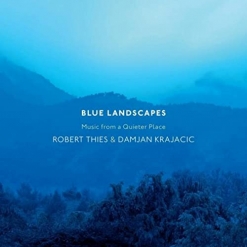
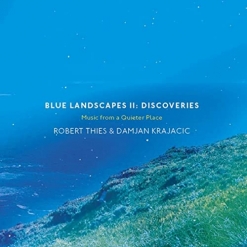
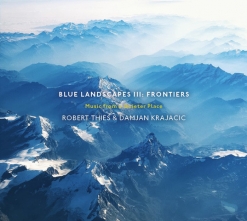
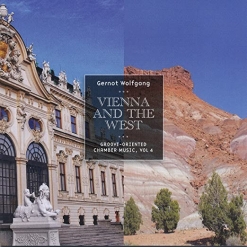
Click on album covers
to go to Kathy's reviews.
KP: How and when did you meet Damjan?
RT: I met Damjan through my wife, so this was around 2003. We made an album together in 2006 of his jazz-inspired compositions, and he was kind to give me some co-writing credit on two compositions.
KP: Do you plan to do a Blue Landscapes IV?
RT: Yes, we do hope to continue the series, but the pandemic has created a certain level of anxiety in such an endeavor. As the music is born out of improvisation, we need to be in the same room, playing at the same time.
KP: Very understandable! Before we move on, I just want to say that I'm really impressed that you have such a varied music background and an appreciation for a broad range of music. Contrary to what so many piano teachers do, I've always tried to expose students to a wide range of music. I think it's so important!
The idea for this interview was inspired by a Facebook post you wrote on 12/13/2020 about the 25th anniversary of your Gold Medal win in the International Prokofiev Competition in St. Petersburg, Russia. You were the first American since Van Cliburn to win a Russian international competition in thirty-seven years. Have any Americans accomplished that since your win?
RT: Though I haven’t kept tabs, it is my understanding that no American has won a first prize in any competition in Russia since.
KP: Wow! The Prokofiev was your first international competition. Did you do others?
RT: A musician’s biography will only list the successes, but rarely lists the failures. I was a laureate in the 1998 Tchaikovsky Competition in Moscow and competed as a semi-finalist, but I did not progress to the final round. There was a well-publicized scandal that year whereby 7 of the 8 finalists were students of the chairman of the jury. And because I won a competition in the rival city of St. Petersburg, I was not destined to follow suit in Moscow. I did apply to compete in the Leeds Competition, but was not accepted, for reasons I’ll never know. I also auditioned to compete in the Cliburn Competition, but I did not play to my best in that audition as it fell on the same weekend I had a recital in Arizona and two concerti in Oregon. Something had to give.
KP: Again, wow! An article I read from the USC News from 1/1996 said that you decided to enter the Prokofiev competition at the very last minute, leaving you only six weeks to prepare. Tell us about that.
RT: 1995 was a wild year. I had applied for a Fulbright Scholarship to study in Vienna. At the very last minute they rejected my application. A friend of mine who was tutoring me in German urged me to go to Vienna Hochschule and audition in person. And so I did. I packed a suitcase with scores, textbooks. After my audition I went down to Graz to participate in the AIMS Festival for Singers and Pianists. Upon my arrival, I had someone call the Hochschule on my behalf to learn that I was still not accepted as a student. My German tutor decided to get friendly with a secretary to see what she could learn of my application. And so she did. The reason for the rejection of my Fulbright application apparently was because I dutifully answered every question including my religious preference, which was…Jewish.
In any case, after I completed the music festival, I decided to buy a Eurail pass and travel around Europe for about seven weeks. It was incredibly inspiring. A friend mailed the Prokofiev Competition application to me when I was visiting friends in Switzerland. I faxed the application to Russia when I was visiting Vatican City. I like to joke that the Pope himself gave me a stamp of approval. I returned home a month later, and this gave me only six weeks to prepare for the competition. Assuming that I would be in Europe all year, my parents had sold my car to my roommate for $500, and so without a car, I had no excuse but to bury myself in preparation. Obviously while I was traipsing around Europe, I did not touch a piano. And so by the time I got home, I was feeling appropriately musically repressed and rejuvenated to get back to my music. I credit my travels as giving me the fuel and inspiration to do the work necessary, which translated to practicing in the range of 6-7 hours per day.
KP: What did you play for the Prokofiev?
RT: The first round involved two separate performances and incorporated many composers. I performed the Beethoven Pathetique Sonata, a Shostakovich Prelude and Fugue, three Etudes of Prokofiev, Rachmaninoff, and Debussy, a Brahms Intermezzo, and some dances from Prokofiev’s ballet, Romeo and Juliet. The second round was intense: Prokofiev’s Sixth Sonata, Ravel’s Gaspard de la Nuit, and Stravinsky’s Trois Mouvements de Petrouchka. The final round was Prokofiev’s Second Piano Concerto and Gershwin’s Concerto in F.
KP: You have said that you lost 8 pounds in the 2 1/2 weeks you were in Russia. What happened?
RT: Basically the organizers served us a lunch/dinner at 2 PM - which was modest in size - and nothing after that. I went to bed hungry every night. I imagine the stress of the competition and the bitter cold of winter played a role too, but it was really just a lack of calories.
KP: Quoting your Facebook post from December, you said:
"Much changed in the political landscape between Russia and United States in the 37 years between my victory and that of Van Cliburn. I would be reminded of this in the years that followed. My win was mentioned in the Herald Tribune, articles in the LA Times followed, The City of Los Angeles commemorated the victory, and named a day after me. Steven Sample, the President of my alma mater, USC, honored me in his Presidential Lecture Series where I finally performed a concerto with the USC Symphony. I was recognized by the Los Angeles - St. Petersburg Sister City Committee, and even met a princess, a descendant of the Romanov family.
"But there were no calls from management companies or conductors. And certainly no ticker tape parade in New York. And the return trips to Russia for concerts and recordings never manifested, as the country was suffering an economic disaster after the collapse of the Soviet Union.”
KP: That's really shocking! I have a couple of friends who were in some major classical competitions and placed, but they said that it was pretty meaningless unless you took first place. Apparently even first place in an international competition did little to advance your career. Do you think that's changed at all - for better or for worse?
RT: I don’t remember the exact statistics, but when Van Cliburn won the Tchaikovsky Competition in 1958 there were only a handful of international piano competitions. By the time I won in 1995, the number of international competitions more than quadrupled. And so the argument is that management companies and conductors can’t possibly represent or hire every first place prizewinner that comes along. The political landscape had also changed drastically: by the time I arrived to Russia, the Berlin Wall had just come down, followed by the collapse of the Soviet Union. As Russia struggled to rebuild itself, and the tensions of the Cold War settled, interest in Russia waned. Society seems to go through waves, and a lot of it has to do with timing. An American winning a competition in Russia in today’s current political climate might actually draw attention.
KP: Hmmm. How many recordings of classical music have you done?
RT: I have one solo recital CD, a live performance from 20 years ago, out on the market. I did do many solo classical recordings for Yamaha Disklavier: works by Ravel, Prokofiev, Brahms, Beethoven, Schubert, but those were never transferred to a CD format. I started to record a solo CD in 2019, but the pandemic put a halt to that project. But I have recorded many works by living composers. One of those projects is an album of art song by a living French American composer. I recorded the two Brahms Sonatas for Piano and Clarinet, the Dohnanyi Sextet, and a disc of French composers with a violinist, to name a few. I haven’t really counted them.
KP: How have your
Blue Landscapes albums been received by the classical community?
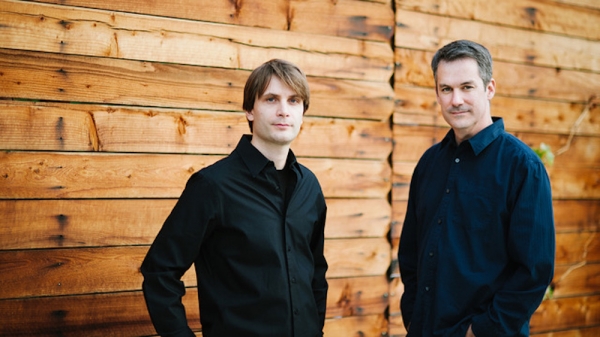
Robert (right)with Damjan Krajacic
RT: Interesting question. I haven’t specifically marketed my albums to the classical community. I have made them available when I played solo piano recitals. But I think classical music audiences get confused when they see CDs of original music. Unless they’ve heard the music, they might be skeptical. Most of these folks want to hear recordings of classical repertoire by composers they can depend on. While many more musicians are like me and have widespread interests in different styles of music, it makes marketing tricky. There is a tendency for all of us to label and compartmentalize others, and record labels, marketers, PR companies, and the general public get confused when they come across someone who doesn’t fit a particular mold. They might ask, "Is he a classical pianist, or a new age artist? Is he a soloist or chamber musician? Wait, why is he releasing a jazz album?"
KP: I couldn't agree more, and it's tragic in a lot of ways. Some of the best composer/pianists I know don't fit into one category, so they often get pushed to the side - too classical for jazz, too dynamic for new age, etc. A unique voice is something I really appreciate.
Aside from the pandemic we are experiencing, do you continue to perform and record classical repertoire?
RT: Yes, I have already recorded five virtual concerts, and more are on the way. It seems to be the solution for music presenters while the pandemic is in full force and preventing the gathering of audiences. I have also done some recording projects for film composers and friends.
KP: This is kind of an "elephant in the room" type of question, but I'd like to ask it anyway. It seems that a lot of people feel that the only legitimate music is classical and really look down their noses at musicians who compose or perform anything else. Have you had to deal with this much? If so, how do you handle it?
RT: I’m glad you asked the question, and yes I do face this to some degree. As far as I am concerned, there are only two kinds of music: good and bad. But this is subjective. I think that musicians who have devoted their lives to their craft should be given a little slack to be a bit more opinionated about what is quality and what is not. After all it helps define their own craft and a standard therein. It doesn’t mean they should make others feel ashamed for liking something else, but if someone thinks I am a snob for having standards for what I consider to be music and musicianship, then so be it. The truth is that in and outside of classical music I am constantly humbled by the musicianship of others from around the world. For example, I only need to listen to thirty seconds of Afro-Cuban music to realize what a limited sense of time and rhythm I have. And as I said, I too have been the subject of feeling judged for my forays outside of classical music. When I was telling a talented composer/colleague about the Blue Landscapes albums, without hearing a note, he immediately dismissed the entire effort by saying, “You’re not going all New Age on me, are you?” I think labels are harmful, and the New Age label in particular has a stigma associated with it. While I boast a large collection of CDs of different artists that have been categorized as such, the genre is indeed inundated with a lot of unimaginative and uninspired music of questionable quality.
KP: Again, I completely agree with all of that. Many artists and promoters have been pushing for years for a "contemporary instrumental" category. "New age" has become so broad that it is meaningless as a definition. There are umpteen different sub-categories for rap, but only one for new age/contemporary classical/ instrumental, etc. I'm still amazed that I reviewed 195 albums and singles last year, and I have never heard ANY of the Grammy nominees in the new age category.
RT: Yes, the “New Age” category is vague as a genre. It should have many subcategories: music for sleep, music for yoga and mantra, electronic music, acoustic music, vocal music. And it should be noted that in 2011, Pat Metheny, one of the greatest jazz guitarists of all time, won in the New Age category for a solo guitar CD. While his work is always top-notch and deserving, and his album likely surpassed the other entries that year in quality and musicianship, it goes to show how meaningless these categories and labels are.
KP: It seems that most classical students and musicians are not encouraged to improvise at all, and are directed to play only what's on the page (my own piano lessons were like that). Your music with Damjan is almost all improvised. Is improvisation something you've aways done, or did that come later?
RT: I started improvising from an early age just out of interest. I liked to sit down at the piano and create sounds, and just fall in love with the instrument itself. Perhaps because I would spend so much time alone practicing the great classical music masters, I yearned also to collaborate with others. I am collaborative by nature, and I discovered how much I enjoy creating and improvising music with others. To get back to your point, indeed the general curriculum for a student of classical music does not include improvisation. And that’s a shame because all the musicians of the Baroque and Classical periods were encouraged to improvise. That is evident when we look at the Urtext editions of Bach and Mozart or explain why Mozart almost never wrote out cadenzas to his concerti. The Urtext editions are bare in notation, because the composers then expected the musician to ornament in a stylistic manner.
KP: Do you compose as well as improvise?
RT: Out of respect to my colleagues who have devoted their lives to composition, I would never call myself a composer. However, I have written, performed, and recorded my own music mostly for some kind of ensemble. For example, some years ago I wrote music for a jazz piano quartet which I hope to release in the coming year.
KP: I look forward to hearing that! Okay, let's back up a bit and learn more about your earlier background. Where were you born and where did you grow up?
RT: I was born in Neptune, NJ, but I moved to Southern California by the time I was three years old. Aside from four years as a child in Colorado, I have lived in and around Los Angeles all my life. I went to high school in Palos Verdes, and went to USC for two music degrees.
KP: What kind of work did your parents do?
RT: My mother worked for a bit as a social worker later in her life. My father worked for the oil company: Atlantic Richfield Company. He didn’t particularly love his job but did it to raise a family.
KP: Did you play in any school orchestras or bands?
RT: Aside from the musical theater productions I played in, I did not play any school orchestras or bands. My musical education was mostly in the form of private lessons.
KP: Are any of your family members musicians?
RT: My father was an amateur jazz player, playing clarinet and saxophone, and played in big bands throughout his life. One of my brothers played in the UC Berkeley “Cal” Band where he met his wife, but then stopped playing.
KP: When did you start playing the piano?
RT: I started playing by ear when I was four years old. My claim to fame was hearing TV show themes and sounding them out on the piano. And so today, I still recall TV show themes from the 70s and early 80s.
KP: When did you start piano lessons and how long did you take them?
RT: I started lessons at five and continued until I was 24, when I finished my Master’s Degree at USC.
KP: Do you play any other instruments?
RT: No. I tried playing some saxophone in 6th grade, probably to impress my father. He lovingly but honestly reflected on that experience with, “Yea, I think it’s good you stuck with the piano."
KP: Hahaha! Kind of like my singing! Did you always know you wanted to be a musician?
RT: Surely I did by the time I was 16. When my piano teacher assigned me such pieces as Rachmaninoff’s Second Piano Concerto, Schumann’s Fantasie op. 17, and the Ravel Concerto, that was a pivotal moment for me, and a point of no return. And then my explorations outside of classical music also intensified an undeniable love and inescapable path in music. I listen to it from the moment I awaken in the morning to the moment I go to sleep.
KP: Did you do piano competitions before college?
RT: Yes I did. It was part of the pedagogical experience. Preparing for a competition compelled me to prepare music to the highest of levels.
KP: Did you ever play in any rock bands?
RT: Apparently I did for a day. A friend of mine had me come to his house when I was maybe 15 years old. I didn’t realize that I was being auditioned. Apparently the guys in the band struggled with the decision whether or not to bring me into the band. According to my friend, it wasn’t a question of whether or not I was good enough; the problem was that I was playing everyone’s parts! And so my rock career never took off.
KP: Probably a good thing! Who are your favorite composers?
RT: So difficult to choose. Brahms and Rachmaninoff sit high on the list. But I am continuously amazed by Ravel and Debussy. And I am very much drawn to Schubert and Schumann, particularly for their art song, and the other big Russian composers: Shostakovich and Prokofiev.
KP: Who and what have been the biggest influences on your music?
RT: I am indebted to my teachers and the high standards they upheld and instilled in me. As for the influences on my own creative endeavors, I am undoubtedly inspired by the great classical music tradition. But I am also inspired by jazz pianists like Keith Jarrett, Chick Corea, Lyle Mays, Leszek Mozdzer, Dave Grusin, and Russell Ferrante, and guitarists like Pat Metheny, Ralph Towner, and Will Ackerman. And then there are pop musicians like Peter Gabriel and Sting, film composers like James Horner, Ennio Morricone, and John Williams, and electronic musicians like Vangelis and Steve Roach. The lists are endless. Aside from the musical influences, I am also inspired by my love for nature and art, and the best achievements of humanity.
KP: What has been your most exciting musical moment or experience?
RT: Certainly the experience in Russia was among the most exciting musical moments for me. But every time I cross the stage to play a concerto with an orchestra is an opportunity that I will never take for granted. The excitement of sharing the stage with 70 other musicians in a performance of a Brahms or Rachmaninoff Concerto provides a thrill that is hard to beat.
KP: Indeed! Do you teach?
RT: I have no regular students at the moment. In order to keep my performance and recording activities my main focus, I will usually accept no more than a couple private students. But I do love teaching, particularly college-level students, and I give frequent masterclasses.
KP: What do you like to do in your free time?
RT: I like to go hiking. I also like to discover international cuisine and visit new restaurants. And I love travel, experiencing culture and architecture, and all forms of art.
KP: What's next for you?
RT: I am recording a virtual concert with a violinist/friend of the Beethoven Kreutzer Sonata. And then with another violinist, I’ll be making a recording of the Prokofiev F minor and Debussy Sonatas.
KP: If you could have any three wishes, what would they be?
RT: I wish that music and art would be considered as important a part of the American education curriculum as English, math, and science. I loved the quote from the 1995 film, Mr. Holland’s Opus: "Well, I guess you can cut the arts as much as you want. Sooner or later, these kids aren't going to have anything to read or write about."
I wish that one of the main tenets of any world religion was one that revered and protected the health of our planet above all.
I wish that I could fly.
KP: Thanks so much, Robert! I really appreciate your taking the time to answer my many questions so thoroughly and honestly. Best wishes on your many projects and performances!
For more information about Robert Thies and his music, be sure to visit
his website and his
Artist Page here on MainlyPiano.com.
Kathy Parsons
February 2021

